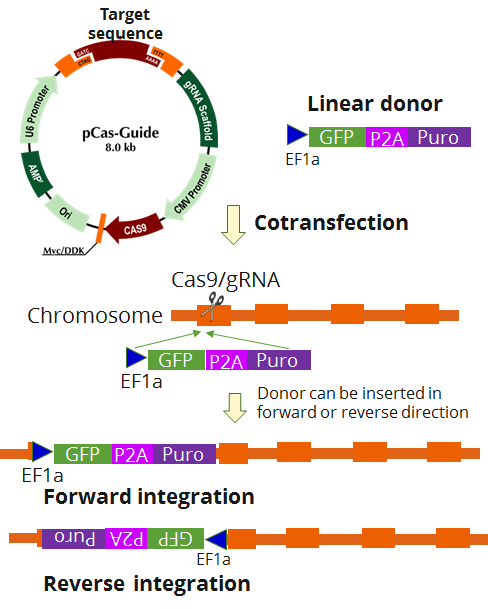Dematin (DMTN) Human Gene Knockout Kit (CRISPR)
CAT#: KN402895
DMTN - KN2.0, Human gene knockout kit via CRISPR, non-homology mediated.
KN2.0 knockout kit validation
KN402895 is the updated version of KN202895.
USD 1,290.00
2 Weeks*
Size
Other products for "Dematin"
Specifications
| Product Data | |
| Format | 2 gRNA vectors, 1 linear donor |
| Donor DNA | EF1a-GFP-P2A-Puro |
| Symbol | Dematin |
| Locus ID | 2039 |
| Disclaimer | The kit is designed based on the best knowledge of CRISPR technology. The system has been functionally validated for knocking-in the cassette downstream the native promoter. The efficiency of the knock-out varies due to the nature of the biology and the complexity of the experimental process. |
| Reference Data | |
| RefSeq | NM_001114135, NM_001114136, NM_001114137, NM_001114138, NM_001114139, NM_001302816, NM_001302817, NM_001978, NM_001323378, NM_001323379, NM_001323380, NM_001323381, NM_001323382, NM_001323383, NM_001323384, NM_001323385, NM_001323387, NM_001323388, NM_001323389, NM_001323390, NM_001323391, NM_001323392, NM_001323393, NM_001323394, NM_001323395, NM_001323396, NM_001323397, NM_001323398, NM_001323399, NM_001323400, NM_001323401 |
| Synonyms | DMT; EPB49 |
| Summary | 'The protein encoded by this gene is an actin binding and bundling protein that plays a structural role in erythrocytes, by stabilizing and attaching the spectrin/actin cytoskeleton to the erythrocyte membrane in a phosphorylation-dependent manner. This protein contains a core domain in the N-terminus, and a headpiece domain in the C-terminus that binds F-actin. When purified from erythrocytes, this protein exists as a trimer composed of two 48 kDa polypeptides and a 52 kDa polypeptide. The different subunits arise from alternative splicing in the 3' coding region, where the headpiece domain is located. Disruption of this gene has been correlated with the autosomal dominant Marie Unna hereditary hypotrichosis disease, while loss of heterozygosity of this gene is thought to play a role in prostate cancer progression. Alternative splicing results in multiple transcript variants encoding different isoforms. [provided by RefSeq, Nov 2014]' |
Documents
| Product Manuals |
| FAQs |
Resources
Other Versions
| SKU | Description | Size | Price |
|---|---|---|---|
| GA101418 | DMTN CRISPRa kit - CRISPR gene activation of human dematin actin binding protein |
USD 1,290.00 |
{0} Product Review(s)
0 Product Review(s)
Submit review
Be the first one to submit a review
Product Citations
*Delivery time may vary from web posted schedule. Occasional delays may occur due to unforeseen
complexities in the preparation of your product. International customers may expect an additional 1-2 weeks
in shipping.






























































































































































































































































 Germany
Germany
 Japan
Japan
 United Kingdom
United Kingdom
 China
China

